|
|
|
Sort Order |
|
|
|
Items / Page
|
|
|
|
|
|
|
| Srl | Item |
| 1 |
ID:
154944
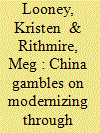

|
|
|
|
|
| Summary/Abstract |
“[T]he plan aims for massive urbanization through the extension of formal permanent residency to current and future migrants in small cities and towns rather than large urban centers.”
|
|
|
|
|
|
|
|
|
|
|
|
|
|
|
|
| 2 |
ID:
187767
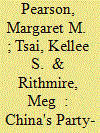

|
|
|
|
|
| Summary/Abstract |
Contrary to expectations, economic interdependence has not tempered security conflict between China and the United States. In response to perceived domestic and external threats, the Chinese Communist Party's actions to ensure regime security have generated insecurity in other states, causing them to adopt measures to constrain Chinese firms. Security dilemma dynamics best explain the subsequent reactions from many advanced industrialized countries to the evolution of China's political economy into party-state capitalism. Party-state capitalism manifests in two signature ways: (1) expansion of party-state authority in firms through changes in corporate governance and state-led financial instruments; and (2) enforcement of political fealty among various economic actors. Together, these trends have blurred the distinction between state and private capital in China and resulted in backlash, including intensified investment reviews, campaigns to exclude Chinese firms from strategic sectors, and the creation of novel domestic and international institutions to address perceived threats from Chinese actors. The uniqueness of China's model has prompted significant reorganization of the rules governing capitalism, both nationally and globally.
|
|
|
|
|
|
|
|
|
|
|
|
|
|
|
|
| 3 |
ID:
183235
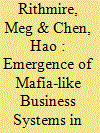

|
|
|
|
|
| Summary/Abstract |
A large body of literature on state–business relations in China has examined the political role of capitalists and collusion between the state and the private sector. This paper contributes to that literature and understanding of the internal differentiation among China's business elites by documenting the emergence of a particular kind of large, non-state business group that we argue is more akin to a mafia system than any standard definition of a firm. Drawing on large-N descriptive data as well as deep ethnographic and documentary research, we argue that mafia-like business systems share organizational principles (plunder and obfuscation) and means of growth and survival (relations of mutual endangerment and manipulation of the financial system). Understanding the particular moral economy that underlies mafia-like business systems and their interactions with the state challenges methodological foundations of research on China's political economy and helps to explain recent conflict between high-profile business people and the state.
|
|
|
|
|
|
|
|
|
|
|
|
|
|
|
|
| 4 |
ID:
124891
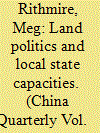

|
|
|
|
|
| Publication |
2013.
|
| Summary/Abstract |
Despite common national institutions and incentives to remake urban landscapes to anchor growth, generate land-lease revenues and display a capacious administration, Chinese urban governments exhibit varying levels of control over land. This article uses a paired comparison of Dalian and Harbin in China's north-east to link differences in local political economies to land politics. Dalian, benefiting from early access to foreign capital, consolidated its control over urban territory through the designation of a development zone, which realigned local economic interests and introduced dual pressures for enterprises to restructure and relocate. Harbin, facing capital shortages, distributed urban territory to assuage the losers of reform and promote economic growth. The findings suggest that 1) growth strategies, and the territorial politics they produce, are products of the post-Mao urban hierarchy rather than of socialist legacies, and 2), perhaps surprisingly, local governments exercise the greatest control over urban land in cities that adopted market reforms earliest.
|
|
|
|
|
|
|
|
|
|
|
|
|
|
|
|
| 5 |
ID:
180072
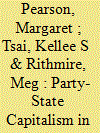

|
|
|
|
|
| Summary/Abstract |
China’s economic model, commonly described as “state capitalist,” is now better characterized as party-state capitalism, in which the political survival of the Communist Party trumps developmental goals. Its tools for managing the economy include not only state ownership and market interventions, but increasing use of party-state power to discipline private capital. China’s entrepreneurs are now expected to adhere to the party line, as are foreign corporations operating in the country. The shift is fueling a backlash from foreign governments that view the fusion of state and private interests in China as a threat to their own national security.
|
|
|
|
|
|
|
|
|
|
|
|
|
|
|
|
|
|
|
|
|